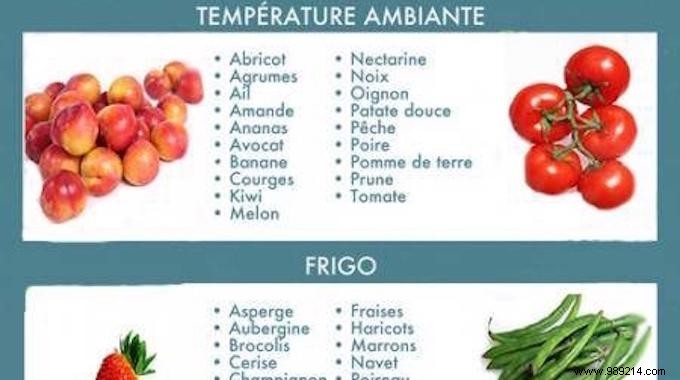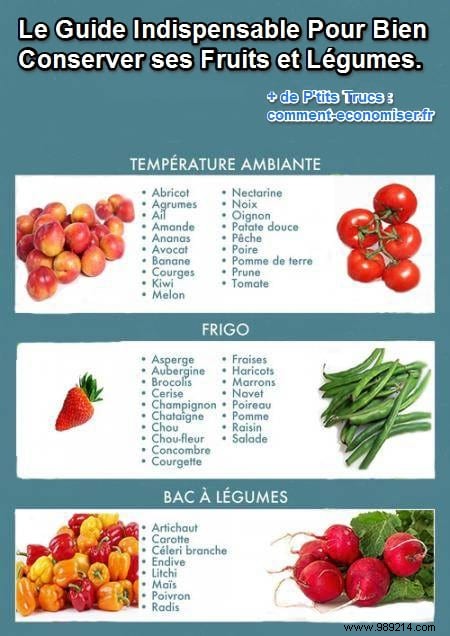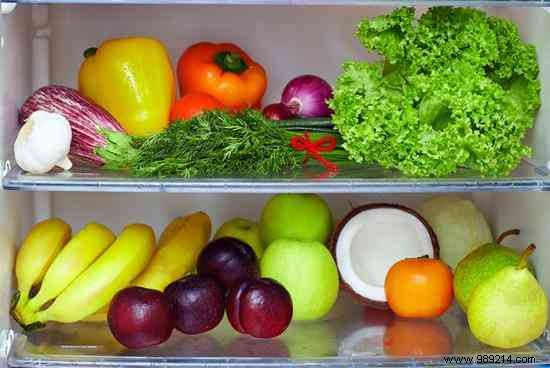
Storing fruits and vegetables is much less simple than it is appears. Anyway for me...
Unlike my grandmother who knows exactly where each vegetable and each fruit should be stored, and how!
Personally, I don't hesitate to put bananas and tomatoes in the fridge and leave apples and strawberries outside. And I have it all wrong!
Because the problem is that some fruits and vegetables give off ethylene. It is a gas that promotes maturation.
And if we don't want our fruits and vegetables to rot quickly, it is better to give up certain cohabitations in the vegetable drawer.
To help you keep your fruits and vegetables as long as possible, here is the guide that tells you where to keep them . Watch:

To easily print it on 1 single page, click here.
Citrus: lemons, oranges, grapefruits are easily stored out of the fridge thanks to their thick skin. Count 1 week out of the fridge and 2 weeks in the fridge.
Pineapple: the rule is to keep your pineapple out of the fridge until it ripens. When ripe, it can be kept for 5 days in the fridge.
Garlic :Store at room temperature. The heads of garlic will keep for 3 to 5 weeks, but the cloves alone will last only 10 days.
Lawyers: Store at room temperature. The best trick to ripen it quickly is to put it in a paper bag with a banana. By putting it in the fridge, on the contrary, you slow down its maturation.
Bananas: the peculiarity of the banana is that it produces a lot of ethylene. It is therefore important to store them at room temperature away from other fruits and vegetables. If they ripen too quickly, they can be put in the fridge in an airtight bag. Their skin will turn black, but the fruit will still taste good inside.
Squash: They keep out of the fridge at room temperature. So much the better, because they take up a lot of space in the fridge!
Kiwi fruit: the kiwis will ripen out of the fridge at room temperature. When they are tender, we put them in a plastic bag that we place in the fridge. They can stay there for another week. If they are not ripe, put them in a paper bag with a banana or an apple.
Melon: melons can be stored at room temperature until they are ripe. When they're ready to eat, wrap them in a plastic bag and put them in the fridge! They can stay there for another week. If you want to speed up the ripening of your melon, put them in a paper bag with a banana or an apple.
Walnuts, hazelnuts, almonds: to prevent them from rotting, keep them in a cool, dry, ventilated place.
Onions: store in a dry and ventilated place. They will keep for 2 to 3 months under these conditions. But if you ever store them next to potatoes, both will quickly rot.
Sweet Potatoes: they can be kept for 2 to 3 months in a cool, dry and ventilated place and one week at room temperature.
Peaches, plums, nectarines and apricots: leave them at room temperature and only wash them when you are about to eat them. When they are ripe, they will keep for 3 to 5 days in plastic in the fridge.
Pears: if you buy them still green, leave them at room temperature. When they are ripe, they go in the fridge in a plastic bag where they can stay for another week.
Potatoes: like onions, but NEVER WITH onions. In a cool, dry and ventilated place, they will keep for 2 to 3 months
Tomatoes: they should always be left at room temperature and eaten at room temperature as well. Do not put them in a plastic bag. The ethylene it gives off would cause them to rot.

Asparagus: these vegetables are fragile. It is better to consume them quickly after buying them. The asparagus are put in the fridge, surrounded by a damp cloth, itself covered with a sheet of aluminum foil. They will keep for 1 to 2 days.
Eggplant: in the fridge, wrapped in a plastic bag.
Broccoli, cabbage, cauliflower: cool, in their packaging. Wash them only when you are about to cook them.
Cherries: in the fridge wrapped in a plastic bag. Wash them just before eating.
Mushrooms: put them in a paper bag in the fridge. They keep for 1 week. Do not wash them in advance.
Chestnuts and Chestnuts: in the fridge, in a paper bag, for 4 to 7 days.
Cucumber: wash it just before eating it. In the meantime, leave it in the fridge, in a plastic bag.
Zucchini: put them in a paper bag in the fridge. Wash them just before eating.
Strawberries: they can be kept for 4 to 7 days in their original packaging in the fridge.
Beans (green, butter): put them in a plastic bag in the fridge. Wash them just before eating.
Lettuces, salads, baby spinach: you can wash them and wrap them in paper towel. Put them like this in a plastic bag in the fridge.
Shuttles: just put them in the fridge in a plastic bag. They keep for 7 days.
Leeks: Store in the fridge in a plastic bag for 7 days.
Apples: apples are among the fruits that give off a lot of ethylene. They should be stored away from other fruits and vegetables. You can put them in a plastic bag and store them in the fridge. Do not wash them in advance.
Grapes: like apples, grapes are only washed before they are eaten. They go in the fridge in a plastic bag with holes so that the air can circulate.

Artichokes: let them open at room temperature. Once they are open, put them in a plastic bag in the vegetable drawer.
Carrots: remove the soil, cut the tops 1 cm from the carrot. Put the carrots in Sopalin before placing them in a bag that closes hermetically in the vegetable drawer.
Celery stalk: rinse it off. Put it in Sopalin. Wrap it in aluminum foil. Place it in the vegetable drawer.
Endives: remove damaged leaves. Then wrap them in Paper Towel. Put them in a paper bag in the vegetable drawer.
Lychees: leave them in a plastic bag with holes in the vegetable drawer. They will keep for 4 to 7 days.
Corn: if your ears have retained their leaves, put them in the fridge as is. If there is only the cob, wrap it in aluminum foil. Then, towards the vegetable drawer.
Pepper: it is a vegetable that releases a lot of ethylene. Therefore, it should be stored away from other vegetables, if possible. Put it in a plastic bag, in the vegetable drawer.
Radish: cut off the tops and keep them in the vegetable drawer.
There you go, I hope this list will help you to better preserve your fruits and vegetables and thus save money :-)